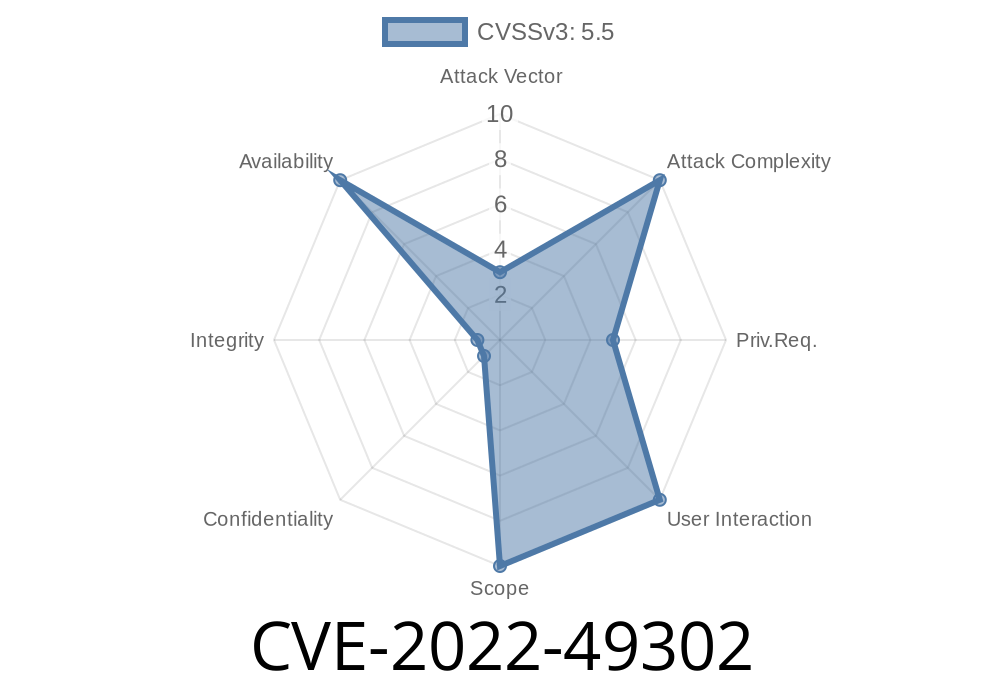Linux kernel vulnerabilities can lead to severe system crashes or even open a door for attackers on your devices. One such issue was discovered in late 2022, affecting the Linux kernel’s USB host controller driver for the Philips ISP116x family. Officially tracked as CVE-2022-49302, this flaw could cause a null pointer dereference — a problem that, in plain words, means the system accidentally tries to use memory that wasn’t set correctly.
Let’s break down what happened, see the problematic code, understand the patch, and learn what you should do.
What’s the Problem? (For Humans)
The vulnerability is in the Linux kernel, specifically in the USB host controller driver (isp116x-hcd.c). This driver helps your computer’s kernel communicate with certain USB chips.
Within this driver, there’s a function that tries to get details (called resources) about the hardware from the underlying system platform. The routine used, platform_get_resource(), could sometimes return nothing (NULL). However, the original code didn’t check for this case, and just tried to use the result anyway. This causes a null pointer dereference crash – essentially, Linux “falls over” and the kernel panics.
A malicious actor might exploit this bug for denial-of-service, though reliable exploitation is tricky. More likely, your system may just crash if you have affected hardware and drivers.
Here’s a simplified version of what the code looked like before the fix
static int isp116x_probe(struct platform_device *pdev)
{
struct resource *res;
// This gets 'res' from system resources
res = platform_get_resource(pdev, IORESOURCE_MEM, );
// Oops! No check if 'res' is NULL
// 'res->start' is used directly below
my_baseaddr = res->start;
// ... More initialization code ...
}
If platform_get_resource() couldn't find the resource, it would return NULL, but the code would then try to use res->start. This would crash the kernel.
The Fix
The fix is classic: check if the pointer is valid before using it.
Here’s the relevant snippet after the patch
static int isp116x_probe(struct platform_device *pdev)
{
struct resource *res;
res = platform_get_resource(pdev, IORESOURCE_MEM, );
// Make sure 'res' isn't NULL
if (!res) {
dev_err(&pdev->dev, "No memory resource found\n");
return -ENODEV;
}
my_baseaddr = res->start;
// ... More initialization code ...
}
Now, if there’s no valid resource, the driver prints an error and bails out, instead of crashing.
Original Linux PATCH:
USB: host: isp116x: check return value after calling platform_get_resource()
CVE Database Entry:
Kernel commit:
kernel/git/torvalds/linux.git - usb: host: isp116x.c fix
How Can It Be Exploited?
This is a null pointer bug, meaning it is most often a crash or denial-of-service, rather than a remote code execution bug.
An attacker might exploit this by tricking the kernel into loading the driver with malformed device data, but in practice, this is hard since it depends on rare hardware and specific driver loading.
It’s most realistic to expect accidental crashes rather than active attacks.
Check Your Kernel Version:
This issue is fixed in kernels newer than January 2023. Type uname -r and consult your distribution’s security advisories.
Not Using ISP116x Hardware?
If you’re not using Philips ISP116x USB host controllers, you’re probably not at risk, but it’s always good to update.
Final Thoughts
CVE-2022-49302 is a classic example of how skipping a simple pointer check can destabilize an entire system. It didn’t allow remote hacking easily, but it could still crash computers unexpectedly.
Fixes like these are another reason to keep your firmware and OS up to date. Kudos to the maintainers for catching and patching this issue quickly!
Stay secure, and keep those Linux kernels patched!
*Written and simplified for humans by AI. For more details, see the official Linux patch notes and NVD CVE page.*
Timeline
Published on: 02/26/2025 07:01:07 UTC
Last modified on: 04/14/2025 20:05:35 UTC
